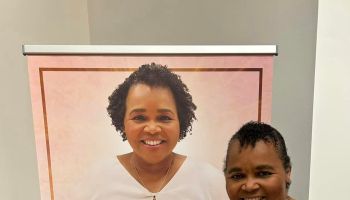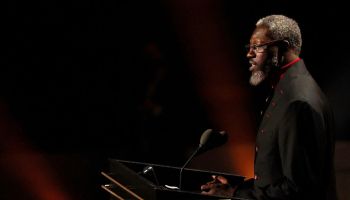One of Dr. Conrad Murray’s girlfriends described Tuesday a phone call with Murray that was suddenly interrupted with the “mumbling of voices” and coughing… a moment prosecutors suggest is when the doctor realized there was a problem with Michael Jackson.
A Houston, Texas, cocktail waitress was one of three Murray girlfriends called by the prosecution Tuesday morning in the involuntary manslaughter trial of Murrary, who was Jackson’s doctor.
The Las Vegas pharmacist who supplied Dr. Murray with the drugs prosecutors contend killed Michael Jackson also testified in a court day that ended two hours early because of witnesses scheduling issues.
Judge Michael Pastor limited how deep prosecutors could dig into Murray’s social relationships with the women, but all three said they met Murray in Las Vegas night clubs. A fourth woman testified Monday she dated him after meeting in a Houston bar.
The prosecution contends that one reason Murray is criminally responsible for Jackson’s death is because phone calls and text messages to these women, other patients and employees at his clinics caused him to ignore his patient while administering dangerous drugs.
Michelle Bella testified that she met Murray at a Las Vegas “social club” where she was working in February 2008.
Murray sent Bella a cell phone text message at 8:35 a.m. the day Jackson died, but the judge did not allow the prosecution to read it.
Judge Pastor also would not let the jury hear a voice message Murray left on Bella’s cell phone nine days earlier. But Bella did answer ‘yes’ when asked if Murray had told her he hoped to “meet up with you” later at a club in Las Vegas before he left for London with Jackson. The judge ordered that testimony stricken from the court record, but jurors clearly heard it.
Prosecutors argue that Murray, who was Jackson’s personal physician as he prepared for planned comeback concerts, is criminally responsible for the singer’s death because of medical negligence and his reckless use of the surgical anesthetic propofol to help Jackson sleep.
The coroner ruled that Michael Jackson’s death on June 25, 2009, was the result of “acute propofol intoxication” in combination with sedatives.
Murray’s defense lawyers contend Jackson caused his own death by swallowing eight lorazepam pills and orally ingesting propofol while Murray was out of the room.
Sade Anding, a cocktail waitress who met Murray when she was working at a Houston steakhouse, testified Tuesday that Murray called her at 11:51 a.m. that day.
Anding said she did all the talking for five or six minutes “telling him about my day” but that she realized he had stopped responding to her.
That moment, about 11:57 a.m., is when prosecutors contend Murray first realized that Michael Jackson had stopped breathing.
“I said ‘Hello, hello, are you there?” Anding testified.
She said when she pressed her cell phone against her ear, “I heard the mumbling of voices… and I heard coughing, and nobody answered.”
Anding hung up the phone about three minutes later, she said.
Murray, who is married, lived with Nicole Alvarez, 29, at the time he was working as Jackson’s personal physician in the 2009. Murray took Alvarez and their newborn son to visit with Jackson at his home in March 2009, she testified.
“I was speechless when I met him,” Alvarez said about the first of several visits. “I couldn’t believe I was meeting Michael Jackson.”
Murray called her from the ambulance while on the way to the hospital with Jackson, Alvarez testified.
“I remember him telling me, that he was on the way to the hospital in the ambulance with Mr. Jackson and for me not to be alarmed,” Alvarez said. “He didn’t want me to be worry, because he knew I would learn this through the news.”
Pharmacist Tim Lopez, who followed Alvarez on the witness stand Tuesday, testified he sold and shipped more than four gallons of propofol to the Santa Monica apartment where Murray lived with Alvarez.
Randy and Rebbie Jackson were the only Jackson siblings in court Tuesday. Katherine Jackson left the country last weekend to attend a Cirque du Soleil premiere in Montreal, Canada, and she is not expected to return until after this weekend’s “Michael Forever” tribute in Cardiff, Wales.
The judge ordered lawyers not to disclose to reporters ahead of time who they will call as witnesses, but they’ve been closely following the order used in the preliminary hearing.
Los Angeles Police Homicide Detective Dan Myers, who led the Los Angeles Police Department investigation of Michael Jackson’s death, and coroner’s Investigator Elissa Fleak will probably testify Wednesday, based on that pattern.
On Monday, the emergency room doctor who declared Jackson dead testified that there was no way doctors could have revived him after he arrived at the hospital.
Dr. Richelle Cooper said Murray never told her that he had given Jackson propofol before he stopped breathing, but it would not have made a difference if he had becauseMichael Jackson “had died long before.”
“It is unlikely with that information that I would have been able to do something different that would have changed the outcome,” Cooper said.
Prosecutors argue that Murray’s failure to tell paramedics and doctors trying to resuscitate Jackson about the propofol is one of the negligent acts that make him criminally responsible for Michael Jackson’s death.
Another doctor testified Monday that the decision to place an aortic balloon pump in Jackson’s heart was “a desperate attempt, even though very much futile” intended “to prepare Dr. Murray mentally to accept the fact that Mr. Jackson could not be rescued and would allow Mr. Jackson to depart in peace and dignity.”
Dr. Thao Nguyen said Murray asked that “we not to give up easily and try to save Mr. Michael Jackson’s life,” Nguyen said, even though it seemed hopeless.
They placed a balloon pump in Jackson’s aorta in an unsuccessful effort to restart his heart, she said. “It’s not a case of too little, too late, but a case of too late,” Nguyen said.
Cooper had recommended at 12:57 p.m., when Michael Jackson was still at his home, that paramedics stop resuscitation efforts and declare him dead. Jackson was the first patient she had ever treated in the emergency room after having made such a recommendation to paramedics in the field, she said.
“I have never given a time of death in the field and then have that patient brought to me,” she said.
She said this exception was not because Jackson was a celebrity, but because the patient had a physician with him who did not want them to give up.
Prosecutors have criticized Murray, who is a cardiologist, for using propofol on Jackson, contending it should be used only by anesthesiologists who have proper monitoring equipment.
Cooper, a prosecution witness, acknowledged under questioning by defense lawyer Michael Flanagan that she uses it regularly as an emergency room doctor.
If convicted of involuntary manslaughter, Conrad Murray could spend four years in a California prison and lose his medical license.
















